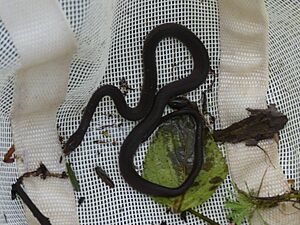Olive marsh snake facts for kids
Quick facts for kids Olive marsh snake |
|
|---|---|
 |
|
| Conservation status | |
| Scientific classification |
|
| Kingdom: | Animalia |
| Phylum: | Chordata |
| Class: | Reptilia |
| Order: | Squamata |
| Suborder: | Serpentes |
| Family: | Colubridae |
| Genus: | Natriciteres |
| Species: |
N. olivacea
|
| Binomial name | |
| Natriciteres olivacea (W. Peters, 1854)
|
|
| Script error: The function "autoWithCaption" does not exist. | |
| Synonyms | |
|
|
Script error: No such module "Check for conflicting parameters".
The olive marsh snake (scientific name: Natriciteres olivacea) is a type of snake. It belongs to a group of snakes called Colubridae. This snake is special because it lives only in Sub-Saharan Africa.
Contents
About the Olive Marsh Snake
The olive marsh snake is a small snake. It shows something called sexual dimorphism. This means that males and females look a bit different in size.
Size and Appearance
Male olive marsh snakes are smaller. They can grow up to 27 cm (11 in) long, including their tail. Female snakes are larger. They can reach a total length of 33 cm (13 in).
The snake's scales are smooth. They are arranged in 19 rows around the middle of its body. Towards the tail, these rows reduce to 17.
The top part of the snake's body (its back) is a dark olive color. Its belly is whitish. The scales around its mouth, called upper labials, are also whitish. They have dark lines where they join together.
Where They Live
The olive marsh snake is found in many countries in Africa. These include Angola, Benin, Botswana, Cameroon, Central African Republic, and both Congos. You can also find them in Equatorial Guinea, Ethiopia, Gabon, Ghana, Guinea, Ivory Coast, and Mali.
Other places where they live are Mozambique, Namibia, Nigeria, Senegal, Somalia, South Africa, Sudan, Tanzania, Togo, Uganda, Zambia, and Zimbabwe.
Preferred Habitat
These snakes like to live in savanna areas. A savanna is a type of grassland with scattered trees. It often has a warm climate.
Life Cycle and Diet
The olive marsh snake lays eggs. This means it is oviparous.
Reproduction
In the early summer, the female snake lays her eggs. She usually lays a clutch of 6 to 8 eggs. Each egg is about 22 millimeters long and 9 millimeters wide.
What They Eat
The olive marsh snake hunts and eats termites. They especially like to eat winged termites.
 | Mary Eliza Mahoney |
 | Susie King Taylor |
 | Ida Gray |
 | Eliza Ann Grier |


